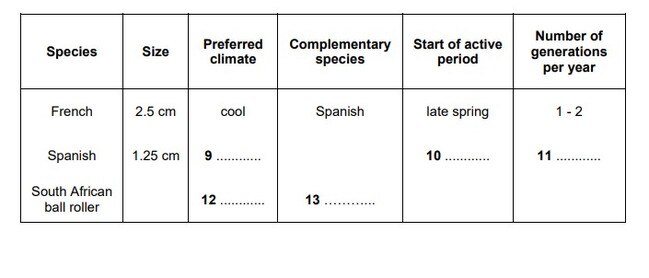‘We have to look elsewhere’: Childcare sector’s bid to overhaul tough test for migrants
Crippled by a shortage of qualified workers, the childcare sector is calling for help from overseas – but is being hampered by an English test so difficult two in three native speakers fail it. Take the test to see how you’d score.

Early Education
Don't miss out on the headlines from Early Education. Followed categories will be added to My News.
The childcare sector is making a bid to reduce English language proficiency for overseas recruits, accusing regulators of treating preschool like a Shakespeare class.
To gain approval to work in childcare in Australia, migrants from all countries except the UK, US, New Zealand, Ireland and Canada must pass an academic English exam.
The required score on the International English Language Testing System (IELTS) test is an average of 7.5 out of a potential 9 bands — a score 67 per cent of native English speakers failed to reach according to the administrators’ own figures.
NSW Childcare Alliance CEO Chiang Lim said setting the standard for daycare hires at the same level as high school teachers has placed an unnecessary “obstacle” in front of skilled migrants.
“Are we trying to teach Shakespeare and Chaucer to zero to five-year-olds? Is that the expectation?” Mr Lim questioned.

“Our preferred first option is for Australian-qualified educators, but when that is still not enough we have to look elsewhere.
“Given the severe labour shortages in Australia and especially in NSW, any flexibility would be welcomed.”

State-based regulatory bodies have collectively commissioned researchers at the University of Melbourne to review the English proficiency requirements, but Mr Lim said action should be taken immediately, not pending a research project that may take twelve months or more to complete.
The Albanese government is “open to changes”, a spokesperson for Early Childhood Education Minister Dr Anne Aly and Home Affairs Minister Clare O’Neil said, but only if the quality of workers can be maintained.
“There aren’t many jobs more important than educating our children,” the spokeswoman said.
“We are open to changes that would create greater access for migrant workers but it cannot come at the expense of quality across this vital workforce.”
According to Jobs and Skills Australia early childhood teachers and child care workers are in short supply in every state and territory, and a recent survey by the Australian Childcare Alliance found over half of services have been forced to cap their enrolments due to inadequate staff numbers, resulting in a loss of 11,123 childcare places over just one week.
United Workers Union acting early education director Carolyn Smith said the workforce crisis is causing centres to close rooms, parents to be unable to find care, and the “really important bond between a child and an educator is being broken” as workers abandon the sector in droves.
However, lowering the IELTS standards would be at best a “Band-Aid” measure, she said, and not a solution to what the union argues is the “major barrier” — wages.

“Even if we changed it, many workers from other countries would choose to work for other industries that pay them more,” Ms Smith said.
“We know the issue of workforce shortages in early learning is actually about pay.
An aged care or disability worker is earning 15 to 25 per cent more than an educator … and workers are voting with their feet.”
CAN YOU PASS THE TEST?
Below are three sample questions from IELTS’ practice tests. Check your answers at the end.
Question 1: Summary Completion (selecting from a list of words or phrases). Read the passage, then complete the summary using the list of words (A-G) below.
‘This Marvellous Invention’. Guy Deutscher, Random House Adult Trade Publishing Group 2006
Of all mankind’s manifold creations, language must take pride of place. Other inventions – the wheel, agriculture, sliced bread – may have transformed our material existence, but the advent of language is what made us human. Compared to language, all other inventions pale in significance, since everything we have ever achieved depends on language and originates from it. Without language, we could never have embarked on our ascent to unparalleled power over all other animals, and even over nature itself.
But language is foremost not just because it came first. In its own right it is a tool of extraordinary sophistication, yet based on an idea of ingenious simplicity: ‘this marvellous invention of composing out of twenty-five or thirty sounds that infinite variety of expressions which, whilst having in themselves no likeness to what is in our mind, allow us to disclose to others its whole secret, and to make known to those who cannot penetrate it all that we imagine, and all the various stirrings of our soul’. This was how, in 1660, the renowned French grammarians of the Port-Royal abbey near Versailles distilled the essence of language, and no one since has celebrated more eloquently the magnitude of its achievement. Even so, there is just one flaw in all these hymns of praise, for the homage to language’s unique accomplishment conceals a simple yet critical incongruity. Language is mankind’s greatest invention – except, of course, that it was never invented. This apparent paradox is at the core of our fascination with language, and it holds many of its secrets.
SUMMARY
The wheel is one invention that has had a major impact on 1 ………… aspects of life, but no impact has been as 2 ………… as that of language. Language is very 3 …………, yet composed of just a small number of sounds. Language appears to be 4 ………… to use. However, its sophistication is often overlooked.
A: difficult B: complex C: original D: admired E: material F: easy G: fundamental
Question 2: Table completion. Read the passage, then complete the table below. Choose NO MORE THAN THREE WORDS from the passage for each answer.
Introducing dung beetles into a pasture is a simple process: approximately 1,500 beetles are released, a handful at a time, into fresh cow pats in the cow pasture. The beetles immediately disappear beneath the pats digging and tunnelling and, if they successfully adapt to their new environment, soon become a permanent, self-sustaining part of the local ecology. In time they multiply and within three or four years the benefits to the pasture are obvious.
Dung beetles work from the inside of the pat so they are sheltered from predators such as birds and foxes. Most species burrow into the soil and bury dung in tunnels directly underneath the pats, which are hollowed out from within. Some large species originating from France excavate tunnels to a depth of approximately 30 cm below the dung pat.
These beetles make sausage-shaped brood chambers along the tunnels. The shallowest tunnels belong to a much smaller Spanish species that buries dung in chambers that hang like fruit from the branches of a pear tree. South African beetles dig narrow tunnels of approximately 20 cm below the surface of the pat. Some surface-dwelling beetles, including a South African species, cut perfectly-shaped balls from the pat, which are rolled away and attached to the bases of plants.
For maximum dung burial in spring, summer and autumn, farmers require a variety of species with overlapping periods of activity. In the cooler environments of the state of Victoria, the large French species (2.5 cms long), is matched with smaller (half this size), temperate-climate Spanish species. The former are slow to recover from the winter cold and produce only one or two generations of offspring from late spring until autumn. The latter, which multiply rapidly in early spring, produce two to five generations annually.
The South African ball-rolling species, being a sub-tropical beetle, prefers the climate of northern and coastal New South Wales where it commonly works with the South African tunnelling species. In warmer climates, many species are active for longer periods of the year.

Question 3: Multiple choice. Read the passage below, then choose TWO letters (A-G) from the options below.
Clearly, when older people do heavy physical work, their age may affect their productivity. But other skills may increase with age, including many that are crucial for good management, such as an ability to handle people diplomatically, to run a meeting or to spot a problem before it blows up. Peter Hicks, who co-ordinates OECD, work on the policy implications of ageing, says that plenty of research suggests older people are paid more because they are worth more.
And the virtues of the young may be exaggerated. ‘The few companies that have kept on older workers find they have good judgement and their productivity is good,’ says Peter Peterson, author of a recent book on the impact of ageing. ‘Besides, their education standards are much better than those of today’s young high-school graduates.’ Companies may say that older workers are not worth training because they are reaching the end of their working lives; in fact, young people tend to switch jobs so frequently that they offer the worst returns on training. The median age for employer-driven training is the late 40s and early 50s, and this training goes mainly to managers. (The Economist Newspaper Limited, London, 1999)
The list below gives some of the advantages of employing older workers. Which TWO advantages are mentioned by the writer of the text?
A: They are less likely to be involved in careless accidents.
B: They can predict areas that may cause trouble in the future.
C: They are able to train younger workers.
D: They can deal with unexpected problems.
E: They are more conscientious.
F: They are prepared to work for lower salaries.
G: They are more skilled in personal relationships
Question 1 answers: E (material), G (fundamental), B (complex), F (easy).
Question 2 answers: 9. temperate 10. early spring 11. two to five 12. sub-tropical13. South African tunnelling/tunnelling
Question 3 answers: B and G





